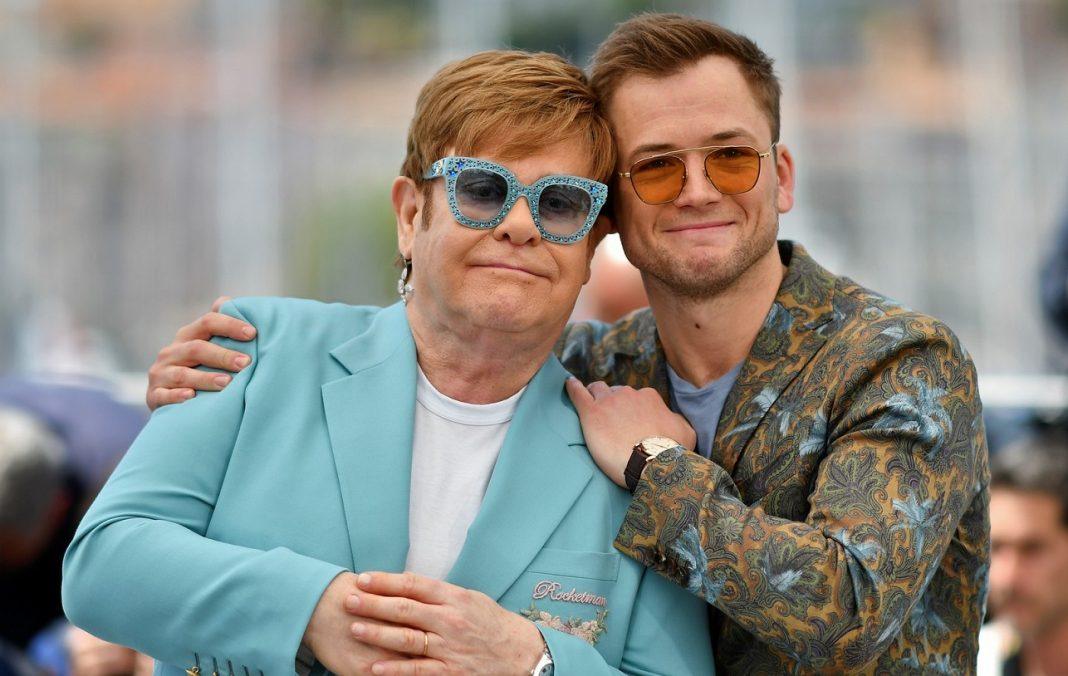
In a case of goodbye yellow brick road, hello Cannes red carpet as Elton John made an appearance at the film festival as part of his extended global farewell tour.
The musician, who has announced that he will retire from performance in 2021 at the conclusion of a 300-date world tour, appeared on the Croisette for the premiere gala of upcoming biopic “Rocketman,” where he was joined by the actor playing him, Taron Egerton, as well as “Bodyguard” star Richard Madden, who plays John’s former lover and manager John Reid, the film’s director Dexter Fletcher and John’s husband David Furnish.
John characteristically was in more flamboyant attire than his fellow attendees, with the musician dressed in a tuxedo emblazoned with sequins spelling out the film’s title (and name of John’s 1972 hit). He stood out too at the film’s photo call, where he sported a powder blue suit and matching glasses.
The 72-year old, who underwent surgery on his knee last year, was seen to be visibly limping on his way up the red carpet and opted against climbing the steps to the Palais des Festivals.
Elton John and his biopic “Rocketman” landed Thursday at the Cannes Film Festival, where the 72-year-old pop star came dressed in a tuxedo with “Rocket Man” emblazoned on the back and regaled attendees with an after-party performance on the beach.
John, an executive producer of the film, hadn’t spoken much about the movie before it made its premiere at Cannes. But donning heart-shaped, red-tinted glasses he gave the movie his hearty blessing Thursday. At the post-premiere party, he called it “an emotional night.”
“Even if the movie doesn’t make one penny at the box office — which will kill (Paramount Pictures chief) Jim Gianopulos — it is the movie I wanted to make,” John said from the stage.
At the party John performed “I’m Still Standing” before being joined by Taron Egerton, who plays him in the film for a rendition of “Rocket Man.” Egerton was visibly moved to tears after the premiere.
“Rocketman” is directed by Dexter Fletcher who also took over directing duties on last year’s hit music biopic, “Bohemian Rhapsody,” after Bryan Singer departed mid-production.
“Rocketman” isn’t so dissimilar from “Bohemian Rhapsody.” It’s a glossy music-stuffed biopic with a star-making turn from Egerton. But “Rocketman” is R-rated and less cautious about its star’s homosexuality.
Paramount Pictures hopes “Rocketman” can also mimic the box office of “Bohemian Rhapsody.” It grossed $903 million worldwide.
“Rocketman” traces John’s life and career, from his early breakthrough to his difficulties with substance abuse and his own sexual orientation. The film also explores the musician’s creative partnership with songwriter Bernie Taupin, who was in attendance at the festival.
Ahead of its premiere, there was speculation that some of “Rocketman’s” same-sex content would be censored in order to achieve a US PG-13 rating (equivalent to a 12A rating in the UK), with the Daily Mail reporting that Fletcher had been pressured by producer Paramount to cut 40 seconds of a scene in which Egerton and Madden are seen partially naked. However, the film has since been given a more mature R rating, and Fletcher has promised that it will be a “no-holds barred” account of the singer’s life.
John has praised Egerton’s portrayal in the film, particularly Egerton’s decision to perform all the songs himself. “It’s not [Queen biopic] Bohemian Rhapsody where the brilliant Rami Malek, who played Freddie [Mercury], lip synched. You’re actually doing the whole thing,” he told Egerton in an interview with Beats 1 radio.
Rumours that John might himself perform on the red carpet ahead of the premiere proved to be wide of the mark, despite a mischievous hint from Thierry Frémaux that a piano would be “hidden behind the curtain,”. However, it is hoped that the singer is will perform at a private aftershow party following the premiere.
Bacurau Western Brings The Violence To Cannes
Kleber Mendonça Filho’s Cannes entry “Bacurau” is a feverish and violent Western about a rural Brazilian community defending itself from a hard-to-comprehend invasion. For the filmmakers, it’s not so different than President Jair Bolsonaro’s Brazil.
“Bacurau,” which is competing for the Palme d’Or, the top prize, gave the Cannes Film Festival’s most searing political statement yet. While the film is a bloody, surreal Brazilian parable with shades of “The Most Dangerous Game” and “Seven Samurai,” its makers spoke in blunter political terms Thursday.
“Brazil right now does feel like a dystopia in many, many everyday aspects,” Mendonça said to reporters.
At the Cannes premiere to his 2016 film, “Aquarius,” Filho and his cast three years ago memorably held placards that declared a coup had taken place in Brazil. Just weeks earlier, Brazil’s left-wing former president Dilma Rousseff had been impeached. Last October, Bolsonaro — a populist, right-wing leader sometimes compared to U.S. President Donald Trump — was elected, ushering in a fraught new chapter for Brazil.
This time, Mendonça, his co-director Julian Dornelles and their cast didn’t protest on the red carpet. “Bacurau,” they said, spoke for them.
“We used the movie as our weapon,” said actor Thomas Aquino. “This is our answer. This is how we protest.”
While “Bacurau” was premiering Wednesday night in Cannes, tens of thousands of students and teachers protested in Brazilian streets over steep budget cuts to education that Bolsonaro has announced. The filmmakers said they stood in solidarity with those protesters.
“It’s very important that you don’t go insane,” said Mendonça on Thursday. “Like: ‘Yeah, maybe we cut 30% of education, maybe that’d be a good thing.’”
“We should never lose sight of what we believe in,” he added. “I think that is what resistance is under some strange system you don’t believe in.”
Bolsonaro has said he believes indigenous groups in Brazil have too much land set aside for their control. He supports making parts of the Amazon easier for miners and loggers to access.
Bolsonaro has also criticized the arts for “cultural Marxism” and dissolved the country’s ministry of culture. Funding for Latin America’s biggest film and television industry has been significantly reduced.
But Brazil has a significant presence at this year’s Cannes Film Festival, including Karim Ainouz’s “Invisible Life,” playing in Un Certain Regard, a section of the festival’s official selection. As part of Cannes’ main slate, “Bacurau” is the most prominent.
“It’s just amazing that this film is seeing the light of day at a time when in fact they are trying to hide Brazilian cultural output,” said Mendonça.
During production on “Bacurau,” the Brazilian government declared that Mendonça had to return about $500,000 from a grant for his debut feature, “Neighboring Sounds.” He calls the demand “unprecedented in the history of Brazilian filmmaking.”
“When ‘Bacurau’ was announced in Cannes this month, they came up with another press package about this, which is not a coincidence,” Mendonça said. “We are dealing with this with lawyers and we hope to overturn it. It makes no sense whatsoever.”
While “Bacurau” has been in development for the last decade, Mendonça said the film’s extremes of “Bacurau” were fueled by Bolsonaro’s election.
“It was almost like reality was catching up with the script,” said Mendonça. “When that happened, we went up to 11, we went over the top.”


